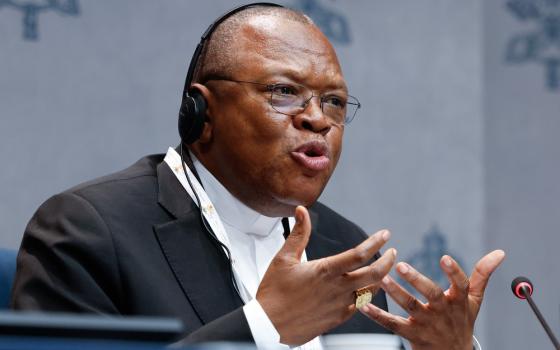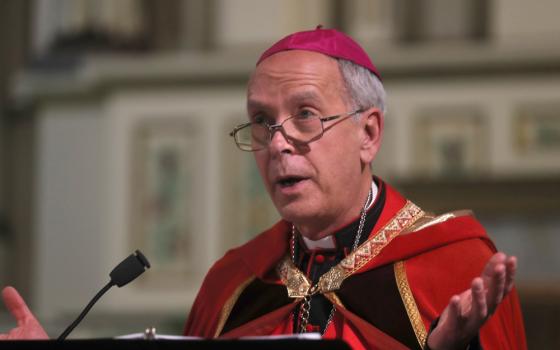
VATICAN CITY -- Vatican magistrates have formally indicted Pope Benedict XVI's personal assistant, Paolo Gabriele, on charges of aggravated theft and have indicted a computer technician from the Vatican Secretariat of State on minor charges of aiding Gabriele after he stole Vatican correspondence.
The publication Monday of the decision of Piero Bonnet, the Vatican's investigating judge, included for the first time the naming of a second suspect, Claudio Sciarpelleti, the Secretariat of State employee.
Vatican police found an envelope from Gabriele in Sciarpelleti's desk and arrested him, according to the documents explaining Bonnet's judgment. While the computer expert gave "contrasting versions of the facts" to investigators, in the end it was determined that there was enough evidence to bring him to trial on a charge of aiding and abetting Gabriele after the fact.
The Vatican magistrates did not set a date for the trial or trials, but Jesuit Fr. Federico Lombardi, Vatican spokesman, said it would not be set before Sept. 20 because the Vatican court is in recess from Tuesday to Sept. 20.
Lombardi said the charge against Sciarpelleti carries a "very light" sentence, which is unlikely to include any jail time.
Pope Benedict could have intervened at any time to stop the investigation and legal process and he still has the option of clearing the two laymen without a trial.
If the pope does not intervene, Gabriele and Sciarpelleti would go to trial before a panel of three Vatican judges, all of whom are laymen and professors at Italian universities. Vatican law, like Italian law, does not foresee the use of juries in criminal trials.
Gabriele, who will turn 46 on Sunday, faces a sentence of one to six years in prison. Under the terms of the Vatican's 1929 treaty with Italy, a person found guilty and sentenced to jail time by a Vatican court would serve his term in an Italian prison.
Bonnet's report quoted Gabriele as telling Vatican investigators he acted after seeing "evil and corruption everywhere in the church" and he was sure Pope Benedict was not fully informed about what was going on.
"I was certain that a shock, even in the media, could be healthy in putting the church back on the right track," Gabriele was quoted as saying. "In a certain way I felt infiltrated" by the Holy Spirit, he said.
Gabriele also made it clear that he had discussed with a spiritual adviser his concerns about the church and his thoughts in taking the documents.
In fact, Bonnet said, the priest affirmed that Gabriele had given him a box full of documents, which the priest told Vatican investigators he burned because he knew "they were the fruit of an act that was not legitimate" and because he feared they would be stolen from his residence which had been burglarized a few months earlier.
Gabriele was arrested May 23 after confidential letters and documents addressed to the pope and other Vatican officials were found in his Vatican apartment, Bonnet's report said. Many of the documents were the same as those featured in a January television program by Italian journalist Gianluigi Nuzzi and later published in a book by him. Most of the documents dealt with allegations of corruption, abuse of power and a lack of financial transparency at the Vatican.
Gabriele told investigators how he met Nuzzi in an apartment near the Vatican and described in detail the measures he and Nuzzi took to avoid detection.
Bonnet said investigators also found in Gabriele's apartment: a check made out to Pope Benedict for 100,000 euros (almost $123,000) from a Catholic university in Spain; a nugget -- presumably of gold -- from the director of a gold mining company in Peru; and a 16th-century edition of a translation of the Aeneid.
Gabriele was questioned repeatedly over the two-month period he spent detained in a 12-foot-by-12-foot room in the Vatican police barracks. He was allowed to return, under house arrest, to his Vatican apartment with his wife and family July 21 and will remain under house arrest until his trial.
His lawyers had explained in July that the house arrest included a number of conditions: He may not leave his Vatican apartment or communicate, including by telephone or Internet, with anyone beside his immediate family, a spiritual adviser, his doctor or lawyers except with the express permission of the Vatican magistrates.
The defense lawyers, Carlo Fusco and Cristiana Arru, have said everything their client did, he did for love of the church and the pope. However, whether or not any of those actions were crimes will be up to Vatican magistrates or a Vatican court to determine, they told reporters.
Fusco had said Gabriele cooperated with Vatican investigators "very broadly" throughout the investigation.
"One thing Paolo repeated to us and to the judge was that he always was and still is motivated by a desire to do something that would be an act of helping, an act of love for the pope," Fusco said.
The lawyers said Gabriele was not part of any network or conspiracy and they insisted he received no money for what he did.
At the same time, Fusco and Arru said Gabriele has expressed a desire to speak to the pope and ask his forgiveness. Fusco said that did not mean that Gabriele did anything criminal, but the pope has said he was saddened by what happened and Gabriele is sorry for that.
Fusco also revealed that Gabriele had written "a confidential letter to the pope," asking for his forgiveness and telling the pope he had acted alone. The lawyer said that because it was not part of the legal process, he had not read the letter, which was given to commission of cardinals carrying out a separate investigation of leaks.

